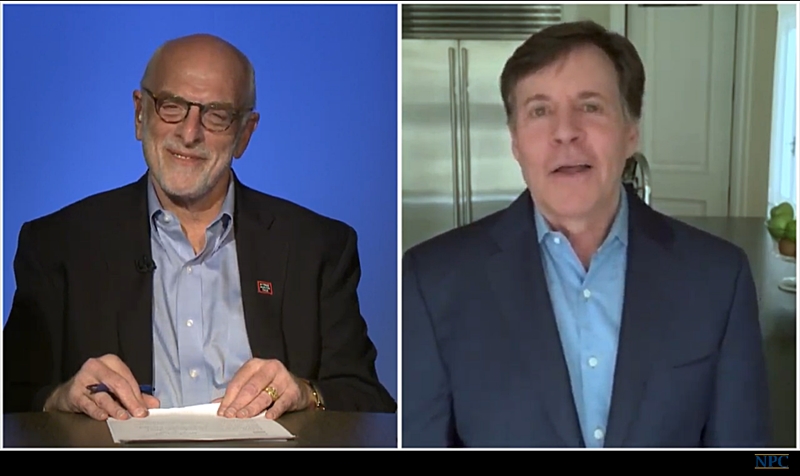COVID-19 reveals ‘hypocrisy’ of college athletics, says broadcaster Bob Costas
Legendary television sportscaster Bob Costas said the coronavirus pandemic has laid bare the “hypocrisy” of college athletics and football during a National Press Club Virtual Newsmaker on Friday, Nov. 6.
With some campuses struggling to stop the spread of the COVID-19 infection and laying out extensive protocols to do so, college football has continued, with student-athletes expected to keep practicing and playing with no salary or union protections, unlike the professional game. Costas said the inequity is stark, and with football ongoing but most other activities shut down, it shows where administrators’ priorities lie.
“Are students going about their normal activities represented by these football teams?” Costas asked in an interview with Club President Michael Freedman. “Does the debate team say, ‘Dammit, I demand that we have all the same competitions that we normally have, including if we have to travel from point A to point B?’ No. It’s only for big-time college football that we’ll do this.”

Football remains an all-consuming obsession for many Americans, and its role in delivering income for television networks means it has an outsized influence in popular culture, Costas said. While other professional leagues have been forced to dramatically rethink their operations this year during the pandemic, the NFL pledged to push on despite positive cases, which he said is a reflection of how badly Americans need it.
“What we’ve seen is football is king. not just in sports, in a fractionalized entertainment universe,” Costas said. “It’s the single most important thing by far in all American entertainment and all of American television.”
A stalwart of NBC’s Olympic Games coverage, who also has done play-by-play for several World Series, Super Bowls and NBA Finals and still calls games on MLB Network, Costas was critical of some in the media who have said professional athletes should “stick to sports” and not speak up on issues of social and racial justice. Those issues have come into greater focus this year with the nationwide protests this summer after the police killing of George Floyd in Minneapolis.
Costas, whose essays during Sunday Night Football on NBC at times explored sports, politics and society, said people should feel free to express themselves, and those who object clearly have their own agenda.
“Those who say, ‘Stick to sports,’ it’s so transparent,” Costas said. “They mean, ‘Stick to sports if you’re saying something I don’t agree with and I don’t want to hear.’”
The coronavirus has forced major changes in how sports is covered on television, with many broadcasters calling games off monitors as opposed to being on-site with an enormous production team behind them. Costas said in the interests of cutting costs, television networks may find that method more preferable, although it will mean pain and job losses for those in the industry.
“Eventually, when COVID is behind us, I think the lasting effect will be for television,” Costas said. “All the television outlets have discovered that you can produce and present a lot of these events from a studio.”
